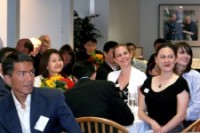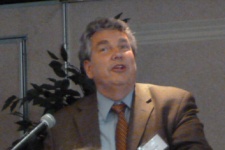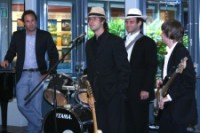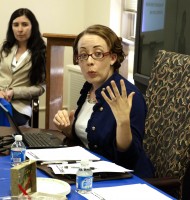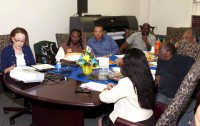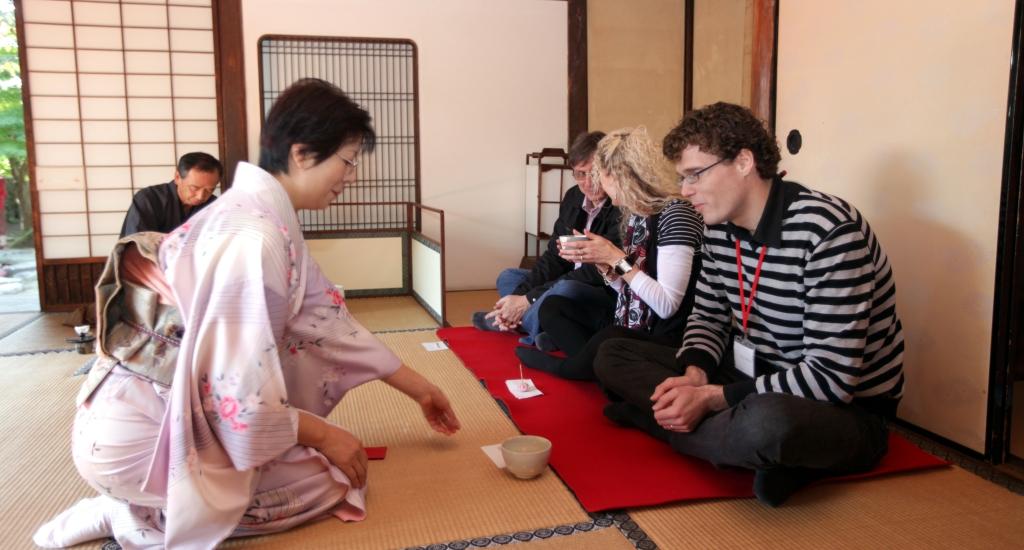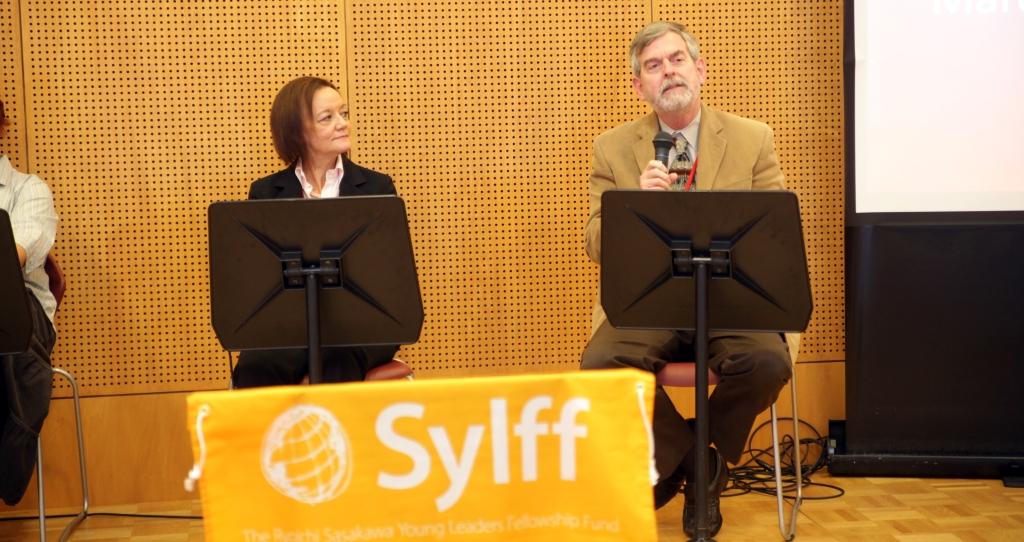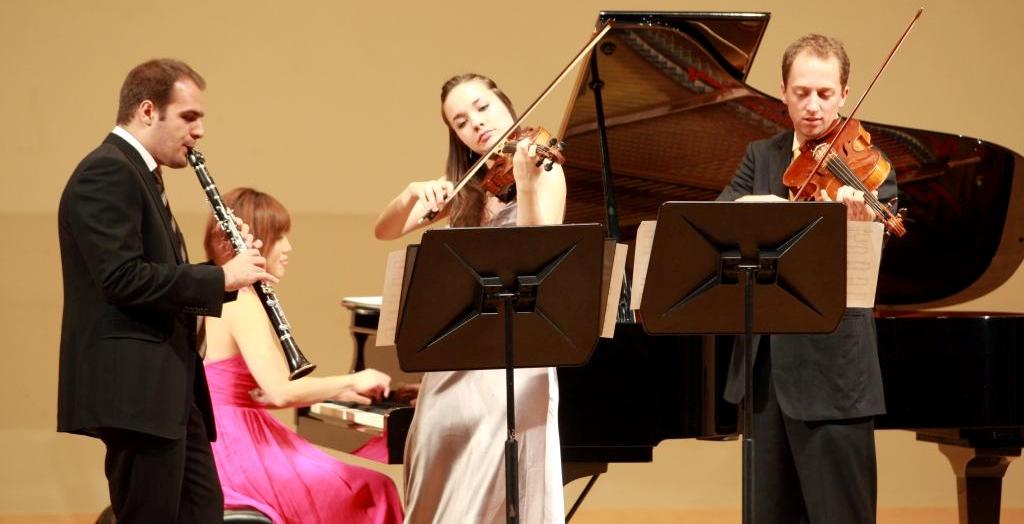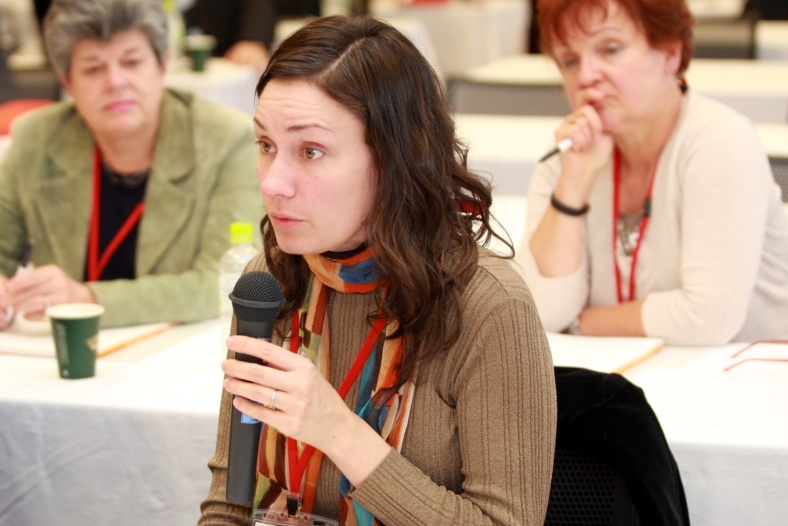In late April, a little more than a month following the Great East Japan Earthquake, a group of 32 young leaders from 14 Asian countries gathered in the ancient capital of Nara in western Japan to participate in a “Building a Better Asia” 1 retreat to discuss various key issues confronting society and to deepen friendships.
Among the participants were 12 Sylff fellows from 7 countries. Following their stay in Japan, the fellows offered words of encouragement and support for the country that has been devastated by the earthquake, tsunami, and nuclear crisis.
The messages below are preceded by each fellow’s name, country, current position, and the institution where and the years during which they received Sylff fellowships.

 Sherilyn Tan Siy (Philippines), writer, Eco+Waza magazine
Sherilyn Tan Siy (Philippines), writer, Eco+Waza magazine
Ateneo de Manila University, 2004-07
To the people of Japan, please know that your struggles have not been in vain. I share the deep pain of loss and grieve for the senseless deaths of so many people, especially children and the elderly. I believe that through this event, your humanity shines forth. May you find untapped sources of strength within you, and may you be filled with hope that tomorrow will be better. All shall be well . . . all shall be well.
 Sadia Khan (Pakistan), executive director, Delta Shipping (Pvt) Ltd
Sadia Khan (Pakistan), executive director, Delta Shipping (Pvt) Ltd
INSEAD, 1995-96
May God give you strength to bear your loss and the courage to rebuild your lives. My home country, Pakistan, has faced two major natural disasters in the last five years: a terrible earthquake in 2005 and unprecedented floods in 2010 that affected more than 20 million people. We can relate to the suffering of the Japanese people at this time of national grief, and our thoughts and prayers are with you. We also know the resilience of the human spirit and, in particular, the indefatigable will and energy of the Japanese people; we are sure that the nation will rise to the occasion to provide for those in need. We wish you God speed in your recovery efforts.
 Katherine Galang Lacson (Philippines), lecturer, Department of History and Department of Communication, Ateneo de Manila University
Katherine Galang Lacson (Philippines), lecturer, Department of History and Department of Communication, Ateneo de Manila University
Ateneo de Manila University, 2003-06
I have been lucky enough to participate in several exchange programs in Japan, which exposed me to the beauty of the country, its people, and its culture. In 2004, one of these programs brought me to a beautiful prefecture called Miyagi, and I visited a very peaceful city called Sendai, where I met many wonderful people, including the very loving family of Michio and Kazuko Waku with whom I had the privilege of staying. We have lost touch over the years, but the memory of their hospitality has stayed with me. So it was a shock to see TV images of the tsunami devastating this beautiful city. I felt helpless as I watched the events unfold, so I did what I could do: I prayed. My prayers went to Michio, Kazuko, Kota, and all the other friends I met. I prayed that they were safe, and I prayed for a fast recovery. I believe in my heart that if there was ever a group of people capable of facing this triple crisis with strength and courage, it would be the Japanese, truly resilient and truly inspiring.
 Kamrul Hossain (Bangladesh), senior researcher, Northern Institute for Environmental and Minority Law, Arctic Centre, University of Lapland
Kamrul Hossain (Bangladesh), senior researcher, Northern Institute for Environmental and Minority Law, Arctic Centre, University of Lapland
University of Helsinki, 2001-02
I am writing to express my deepest sympathy to the Japanese people, who just recently suffered from a shocking tsunami that has taken thousands of lives. Thousands of others have lost their homes and relatives. There is no doubt that the pain suffered by the Japanese people will take a long time to heal. Personally, my relationship with Japan is very deep. I have been in Japan three times and stayed for a considerable period each time. I have had the opportunity to become close to the people in Japan and to know how wonderful, hospitable, and respectful the people are. The disaster has been painful not only for the Japanese people but everyone who knows Japan and its people. I hope and wish that Japanese people recover from the shock very soon.
 Ngeow Yeok Meng (Malaysia), senior lecturer, University of Malaya
Ngeow Yeok Meng (Malaysia), senior lecturer, University of Malaya
University of Malaya, 2001-02
During my recent retreat with other young Asian leaders in Nara, I was deeply touched and impressed by the resilience and patience of the tsunami survivors. Safe but cramped into emergency shelters, many were eager to return to the life they led before the tsunami. However, some seemed overwhelmed by the challenges before them. What can we do to show our friendship and commitment? From far or near, we can at least offer material donations. There are still donation boxes on many store counters, subway stations, tourist spots, restaurants, and street corners. I see that the victims have high hopes for themselves and their communities. Many young people are volunteering their time and energy, and they appear more aware of their social responsibilities than before. This is a nation full of hope, and we will see the sun rise again. As foreigners, we wish to express our condolences to those who have lost their lives, and we sincerely hope that peace and harmony will return to the lives and hearts of the survivors. We are with you always.
 Payoshni Mitra (India), independent researcher and consultant with various sport organizations in Britain
Payoshni Mitra (India), independent researcher and consultant with various sport organizations in Britain
Jadavpur University, 2005-08
I recently visited Nara and Osaka to attend the 9th BABA Retreat. Many people told me that this was not the right time to go to Japan. But I am glad I did not listen to them. From the moment I landed, I was amazed by the great courage and strength of the Japanese people, even in times of disaster. There is so much to learn from the Japanese people. I believe that if there is any country that is capable of handling the post-tsunami and nuclear situation, it is Japan. You inspire us with your determination and your ability to withstand hardships and still come out as a champion. I feel sorry for those who have lost near and dear ones in this disaster. I also strongly feel that Japan, as a nation, will overcome this loss soon.
 Ma Xiangxiang (China), legal assistant, DLA Piper, UK LLP, Beijing Representative Office
Ma Xiangxiang (China), legal assistant, DLA Piper, UK LLP, Beijing Representative Office
Peking University, 2006
This was my second visit to Japan and the first to the Kansai area in western Japan. The friendliness of the Japanese people, as well as the country’s economic and commercial prosperity was very impressive. I would like to take this opportunity to express my gratitude to the Japanese people who helped me during my stay in Japan, even though I was a stranger to them. Also, I believe that the calmness and diligence of the Japanese people will help you go through this terrible hardship. May God bless all the Japanese people!
 Kamei Aphun (India), assistant professor, Department of Sociology, Delhi School of Economics, University of Delhi
Kamei Aphun (India), assistant professor, Department of Sociology, Delhi School of Economics, University of Delhi
Jawaharlal Nehru University, 2004-05
World War II destroyed many parts of Japan, but in less than 20 years, the country was rebuilt. This time, the tsunami has caused great damage and suffering. My belief is that in less than 2 years, the country will come back much stronger, with greater unity among the people. My Nara experience speaks volumes about the people: very humble and yet focused, very hard working and yet generous, very determined but supportive. I see that Japan and its people have great potential in pioneering social and economic initiatives for the world. Natural calamities may come, but the people have learned to deal with it calmly and without panic. This is the biggest lesson that the world should learn.
 Citra Wardhani (Indonesia), expert staff, Directorate of Research and Community Services, Universitas Indonesia
Citra Wardhani (Indonesia), expert staff, Directorate of Research and Community Services, Universitas Indonesia
University of Indonesia, 2001-02
The Japanese people are facing many challenges in the aftermath of the earthquake and tsunami and the ongoing nuclear crisis. My heart goes to those affected. We faced the same problem here in Indonesia, except for the nuclear crisis. I saw firsthand how devastating natural disasters can be for people. The loss of family members and homes must have been very painful and difficult, especially for those having to survive the cold, winter weather in the affected areas. But from the disaster, we—the outsiders—have learned a lot from you, such as how you share and work together, how you hold onto your virtues during difficult times, and how you sacrifice for others. We see new heroes emerging. I hope you all recover soon. Many stakeholders in my country are involved with you and are trying to help in any way they can. Please know that you're not alone.
 Sunitha B Nair (India), assistant professor, Payyanur College, Kannur University
Sunitha B Nair (India), assistant professor, Payyanur College, Kannur University
Jawaharlal Nehru University, 2005-06
First of all, I would like to salute all my Japanese friends and the Japanese people for their spirit in facing up the challenge. They are so balanced. From my friends, I have heard that many youths are now volunteering in the tsunami-affected areas, and I really admire their desire to help others. My Japanese brothers and sisters, you can count on the support from all Sylff and BABA fellows. All of us who are the beneficiaries of fellowships are greatly indebted to The Nippon and Tokyo Foundations, and we will offer our support in whichever manner it is required in this period of crisis.
 Sarojini Imran (Indonesia), lecturer, Tourism Destination Faculty and Architecture Faculty, University of Pancasila; lecturer of interior design, Binus University
Sarojini Imran (Indonesia), lecturer, Tourism Destination Faculty and Architecture Faculty, University of Pancasila; lecturer of interior design, Binus University
University of Indonesia, 1999-2001
My dear Japanese friends, no one can avoid natural disasters. In my country, Indonesia, we also often experience earthquakes, tsunamis, and other disasters, as you know. Normally, we ask why we should meet such pain and suffering. We eventually realize, though, that we should really be grateful for the opportunity to think about the true meaning of life. In the face of destruction, the hard work and effort we made may appear to have been in vain, but no effort is really wasted. Nothing can prevent natural disasters, but sometimes we are too greedy and assume that we can ignore nature’s power. During times of disaster, our personal safety and the safety of our families and friends are foremost on our minds. How precious life is! All too often, we are too busy making money, and we have no time for others. But when a disaster strikes, it becomes clear that nothing is more precious than our lives, our families, and our friends. My hope is that the disaster will make us wiser so that we value the things that are most precious. The Japanese concept of gambaru should become a source of strength enabling the people to rise again.
1“Building a Better Asia” is administered by the Information and Resource Center with the support of The Nippon Foundation, the donor of the Sylff endowments. BABA 9 in Nara, Japan, was held over six days to discuss such important issues as “leadership and governance,” “peace and dialogue among cultures,” “human security,” and “promoting a greener economy in Asia.”
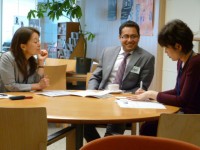
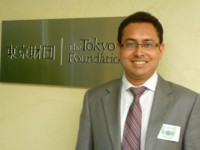 "Thanks to Sylff, I was able to focus my doctoral research on areas in which I was most interested," says Shonchoy. "I've always been very grateful to Sylff for giving me such an opportunity, but I never thought I would actually come and work in Japan, where the fellowship originated. I hope to return the generosity with research that will contribute to building a better society for all."
"Thanks to Sylff, I was able to focus my doctoral research on areas in which I was most interested," says Shonchoy. "I've always been very grateful to Sylff for giving me such an opportunity, but I never thought I would actually come and work in Japan, where the fellowship originated. I hope to return the generosity with research that will contribute to building a better society for all."


